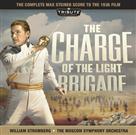|
|
||||
|
by Richard Jack Smith  According to Laurence E. MacDonald’s The Invisible Art of Film Music, The Charge of the Light Brigade was Max Steiner’s first score for Warner Bros. With a wonderful cast featuring Errol Flynn, Olivia de Havilland and David Niven, this 1936 picture proved extremely successful at the box office. The mixture of fun, bravado, love, villainy, strength and vulnerability makes this a definitive Golden Age score. In particular, the 2008 re-recording conducted by William T. Stromberg and performed by the Moscow Symphony Orchestra represents a landmark undertaking. During the opening track “Main Title/Palace of Surat Khan,” trumpets give way to an ominous motif. Also, there’s a marching, journey theme which we will hear many times throughout this score. For “Dispensing with Formalities,” source music (heard by the characters) dictates an isolated rhythm which generates incredible suspense. Interestingly, “A Brilliant Shot” references an earlier work of Steiner’s, the 1933 masterpiece King Kong. Frenzied notes of pressing danger energize the on-screen action. In context with the picture, the music follows Surat Khan (C. Henry Gordon), who finds himself dangerously close to a leopard. Luckily, Major Geoffrey Vickers (Errol Flynn) fires the shot that saves him. The gentle tone returns in “Little Prema and Geoffrey,” a sparkling ode to friendship and kindness. We get a trumpet reprise as well as the signature marching theme for “Soldiers on Parade.” That’s followed by “Calcutta” where pleasant, melodic violins set the scene. A crucial sub-plot for the film revolves around Geoffrey’s brother Perry (Patric Knowles), who has fallen in love with the former’s fiancée Elsa (Olivia de Havilland). As “Perry and Elsa” dance, their flirtations become very apparent to an on-looker. Luckily for them, it’s not Geoffrey. Meanwhile, Steiner’s accompaniment plays like a love theme. “Brothers Reunited” ends on a note of uncertainty as Perry wants to tell Geoffrey about his affair, yet fails to do so. Steiner includes some absolutely gorgeous arrangements here, including “At the Lancers’ Ball” and “Elsa’s Waltz.” By design, war and peace become complementary forces like day turning into night. Another nice touch emerges with “Ballroom Waltz.” This one carries a tranquil ambience, similar to Johann Strauss’s The Blue Danube. Eventually, matters propel Steiner back into the action as “Geoffrey Warns Perry.” This motif races through its pent-up emotions, resulting in a sharp crescendo. “Geoffrey Bids Farewell/Trek to Buy Horses” indicates that matters concerning the love triangle remain incomplete. Meanwhile, a slight shift occurs during the marching theme. There’s less pomp and more anticipation regarding an unknown future. “I’d Rather Hoped for Some Action!” offers a clever foreshadowing of the finale. Cascading notes of dizzying frenzy overlap. This track seems packed to the rafters with excellent action. It’s a show-stopping highlight, which signals the next act of this compelling story. “On to Chukoti” begins with the familiar journey statement. Suffice to say, a quality of optimism drives The Charge of the Light Brigade. Meanwhile, “Prema Tries on a New Salute/Colonel Campbell Annoyed/Lady Warrenton” introduces the niceties of social interaction against a feeling of slight anxiety. The violins provide colour and warmth not merely as background but as a focal point for the characters’ emotions. A sadder key gets taken up by the violins, while Elsa walks “In the Garden with Perry.” It’s an important moment for the characters due to Steiner’s development of their love story. This segues into the “Convoy Returns,” where matters for the British army take a more serious turn. Things get complicated in “Leaving Chukoti Undefended.” As the orchestra begins, the atmosphere feels constricted until Surat Khan’s motif reappears at 1:47. This moment hints at potential disaster, yet the combination of light and dark makes it one of Steiner’s most complex arrangements. Violins provide a nice finish prior to “Attack of the Suristanis.” Frantic, racing lines of melodic urgency build towards a big finish. In terms of narrative progression, the massacre at Chukoti changes everything between Vickers and Khan. The latter shows no mercy, killing men, women and children. Only Vickers is spared, thus Khan repays the life he owes. Wow! It’s like someone dared Steiner to outdo his work on King Kong. In reply, he delivered “The Charge of the Light Brigade,” a masterful ten-minute track. Stretched to their creative and emotional limits - then pushed a mite further - the Moscow Symphony Orchestra deserves a round of applause. Overall, I hope this review will encourage more listeners to appreciate a Golden Age treasure such as The Charge of the Light Brigade. For my part, it's been an incomparable pleasure! |
||
|
© 2026 - ReelTalk Movie Reviews Website designed by Dot Pitch Studios, LLC |



